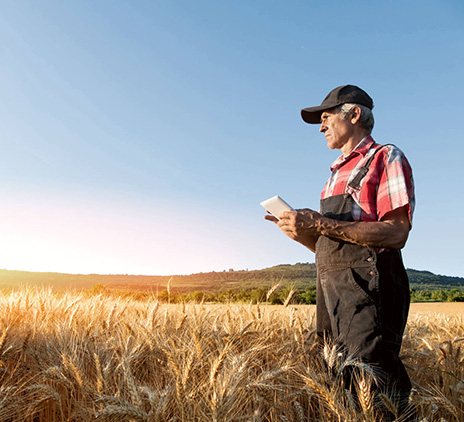-
Financial administration
An accurate financial administration provides you with the information you need to take the right decisions. The big advantage of a digital financial administration is that it provides insight into your most important financial processes at any time, whether this is the invoices, salary payments or bank changes.
-
Financial insight
You want to take the right decisions, based on trustworthy and clear management information. You want to have access to all your financial data, 24/7, in order to determine your position and be able to adjust where necessary.
-
Global compliance partnering
Outsourced compliance services comprises the total financial compliance of your business, in accounting, financial reporting, payroll, legal and various tax reporting obligations. We can make sure you don’t have to worry.

-
Business risk services
Minimize risk, maximize predictability, and execution Good insights help you look further ahead and adapt faster. Whether you require outsourced or co-procured internal audit services and expertise to address a specific technology, cyber or regulatory challenge, we provide a turnkey and reliable solution.
-
Corporate finance
Finding a suitable match at the most optimum terms. That, in a nutshell, aptly describes the objective of mergers and acquisitions. To most businesses mergers or acquisitions are not standard daily practice. It is, however, for the professionals at Grant Thornton! Seeking their services will add value instantly.
-
Cyber risk services
What should I be doing first if my data has been kidnapped? Have I taken the right precautions for protecting my data or am I putting too much effort into just one of the risks? And how do I quickly detect intruders on my network? Good questions! We help you to answer these questions.
-
Impact House
Building sustainability and social impact. That sounds good. But how do you go about it in the complex world of stakeholders, regulations and frameworks and changing demands from clients and society? How do you deal with important issues such as climate change and biodiversity loss?
-
Transaction services
What will the net proceeds be after the sale? How do I optimise the selling price of my business or the price of one of my business activities? How do I capitalise on synergies following an acquisition? Am I not offering too much? These are all good questions when you’re buying or selling a business. It’s a transaction that concerns significant amounts, impacts your future, and therefore must be executed properly. We provide a solid foundation for your decisions.
-
Valuation, investigation & dispute services
Do you require a fact finding investigation to help assess irregularities? Is it necessary to ascertain facts for litigation purposes?

-
Auditing of annual accounts
You are answerable to others, such as shareholders and other stakeholders, with regard to your financial affairs. Financial information must therefore be reliable. What is more, you want to know how far you are progressing towards achieving your goals and what risks may apply.
-
IFRS services
Financial reporting in accordance with IFRS is a complex matter. Nowadays, an increasing number of international companies are becoming aware of the rules. But how do you apply them in practice?
-
ISAE & SOC Reporting
Our ISAE & SOC Reporting services provide independent and objective reports on the design, implementation and operational effectiveness of controls at service organizations.
-
Pre-audit services
Pre-audit services is all about making the company’s entire financial administration ready for checking before the external accountant begins his/her audit of the annual accounts.
-
SOx law implementation
The SOx legislation dictates that management is structurally accountable for reporting on the internal control relevant to the financial statements.

-
International corporate tax
The Netherlands’ tax regime is highly dynamic. Rules and the administrative courts raise new challenges in fiscal considerations on a nearly daily basis, both nationally and internationally.
-
VAT advice
VAT is an exceptionally thorny issue, especially in major national and international activities. Filing cross-border returns, registering or making payments requires specialised knowledge. It is crucial to keep that knowledge up-to-date in order to respond to the dynamics of national and international legislation and regulation.
-
Customs
Importing/exporting goods to or from the European Union involves navigating complicated customs formalities. Failure to comply with these requirements usually results in delays. In addition, an excessively high rate of taxation or customs valuation for imports can cost you money.
-
HR services
Do your employees determine the success and growth of your organisation? And are you in need of specialists which you can ask your Human Resources (HR) related questions? Human Resources (HR) related questions? Our HR specialists will assist you in the areas of personnel and payroll administration, labour law and taxation relating to your personnel. We provide you with high-quality personnel and payroll administration, good HR guidance and the right (international) advice as standard. All this, of course, with a focus on the human dimension.
-
Innovation & grants
Anyone who runs their own business sets themselves apart from the rest. Anyone who dares stick their neck out distinguishes themselves even more. That can be rather lucrative.
-
Tax technology
Driven by tax technology, we help you with your (most important) tax risks. Identify and manage your risks and become in control!
-
Transfer pricing
The increased attention for transfer pricing places greater demands on the internal organisation and on reporting.
-
Sustainable tax
In this rapidly changing world, it is increasingly important to consider environmental impact (in accordance with ESG), instead of limiting considerations to financial incentives. Multinational companies should review and potentially reconsider their tax strategy due to the constantly evolving social standards
-
Pillar Two
On 1 January 2024 the European Union will introduce a new tax law named “Pillar Two”. These new regulations will be applicable to groups with a turnover of more than EUR 750 million.
-
Cryptocurrency and digital assets
In the past decade, the utilization of blockchain and its adoption of a distributed ledger have proven their capacity to revolutionize the financial sector, inspiring numerous initiatives from businesses and entrepreneurs.
-
Expand into new markets
Do you seek for opportunities in the global business arena? Whether you are about to open a new office in a foreign country or considering an international acquisition, you need certainty of making the right choices for your company. Global expansion isn’t always as simple as it sounds. The good thing is that we’re here to help!
-
Expanding your business in the Netherlands
International expansion is an important step. The Netherlands can be your gateway to Europe for doing business abroad. But why you should choose the Netherlands?
-
Global contacts
Wherever you choose to do business, you want access to people with the best ideas and critical thinking that will enable you to grow your business at home and abroad.
-
Corporate Law
From the general terms and conditions to the legal strategy, these matters need to be watertight. This provides assurance, and therefore peace of mind and room for growth. We will be pro-active and pragmatic in thinking along with you. We always like to look ahead and go the extra mile.
-
Employment Law
Small company or large multinational: in any company your people are of the utmost importance for your business. Employment brings with it many issues in many areas and often has legal consequences. For big strategic, but also for more everyday questions about employment law, our lawyers are ready to help you out. Also for questions about international employment law. Do you have your own HR department? We’ll gladly assist them. We deliver bespoke services and are there when you need us.
-
Specialist Areas
Besides our focus on corporate and employment law, we also advise entrepreneurs on a range of (specialist) legal issues. A corporate acquisition, your company administration, complex question in the field of healthcare issues: you have come to the right place.
-
Maritime sector
How can you continue to be a global leader? The Netherlands depends on innovation. It is our high-quality knowledge which leads the maritime sector to be of world class.

-
Growth in an international network
At Grant Thornton, you will benefit from the expertise and quality of colleagues around the world who will benefit your knowledge, advice and growth.
-
Varied customer portfolio
The customer package at Grant Thornton varies from (large) SME customers to (small) corporate customers. From local customers to customers from the international network of Grant Thornton International Ltd. All this diversity in customers can also be recognized in your customer package.
-
Culture
At Grant Thornton we combine a solid base with a flexible and results-driven mentality.
Non-UK businesses need a UK-established customs agent to import / export goods
Non-UK businesses importing in the UK or exporting from the UK need a UK-established customs agent who will act as a declarant of the imported / exported goods. This means that companies who are not established in the UK should ensure that they have a UK customs agent who will import/export their goods after 2020. Non-UK companies can be mentioned as a consignee on the import declaration.
From 1 January 2021, non-UK companies cannot have their own UK duty deferment account (DDA) and they need to rely on the DDA of their UK agent when deferring customs duties. In order to delay submitting supplementary declarations and payment of customs duties up to 6 months (until 1 July 2021), the UK customs agent must be authorized for simplified declarations and have access to a UK DDA.
Movements of goods between GB and NI
VAT rules
HMRC has issued a Policy Paper on 26 October 2020 which sets out how VAT should be accounted for after the end of the transition period. HMRC confirms in its letter to UK VAT registered businesses that there will be no requirement for a new or separate VAT registration for sales of goods in NI, and both GB and NI sales should continue to be reported on a single UK VAT return.
With a small number of exceptions, HMRC has stated that the current system of accounting for VAT (i.e. as domestic UK supplies) will continue. Consequently, if a business will deliver goods from the GB to NI or vice versa then VAT will continue to be accounted as it is currently on goods sold between GB and NI. This means that the seller of the goods will use its GB VAT number and continue to charge its customers VAT and should show this on its invoices. The VAT charged will be accounted for as output VAT on the VAT return in the same box as it is now. Please note that some exceptions apply.
Customs
HMRC has published some guidance for UK businesses what declarations need to be made for goods brought or received into GB or NI from 1 January 2021.
From GB to NI
For most goods no exit declarations will need to be made. Guidance on this will be published at a later date.
- an entry summary (safety and security) declaration must be submitted before the goods arrive
- an entry declaration will need to be made when the goods arrive.
From NI to GB
- For most goods no entry declarations will need to be made. Guidance on this will be published at a later date.
XI number
A special VAT identification (ID) number with the specific prefix “XI” will be used by businesses in Northern Ireland (NI), so that EU VAT provisions can be properly applied to goods, in line with the special rules as per the NI Protocol applicable on NI.
HMRC confirms in its letter to UK VAT registered businesses that there will be no requirement for new or separate VAT registration for sales of goods in NI.
For goods under the EU rules, as per the NI Protocol:
- goods are located in NI at the time of sale;
- goods supplied in NI by VAT-registered EU businesses; or
- the sale or movement goods from NI to EU or vice versa.
then businesses should substitute ‘XI’ country code in their GB VAT number on invoices.
From 1 January 2021, to move goods to or from NI, businesses will need an EORI number that starts with XI. Companies that have an existing GB EORI number can apply for a NI one.
Trade Support Service
Businesses who move goods between Great Britain and Northern Ireland from 1 January 2021, can sign up for the free Trader Support Service.
Collection of Intrastat Data
Businesses currently registered for Intrastat or in the coming year exceeding the Intrastat exemption threshold, which is £1,500,000 for EU imports (arrivals) and/or £250,000 for EU exports (dispatches), must submit Intrastat declarations in 2021 for the following movement of goods:
- Goods imported into Great Britain (GB) from the European Union (EU).
- Goods imported into Northern Ireland (NI) from the EU.
- Goods exported from NI to the EU.
No need to submit Intrastat declarations for goods exported from GB to the EU.





